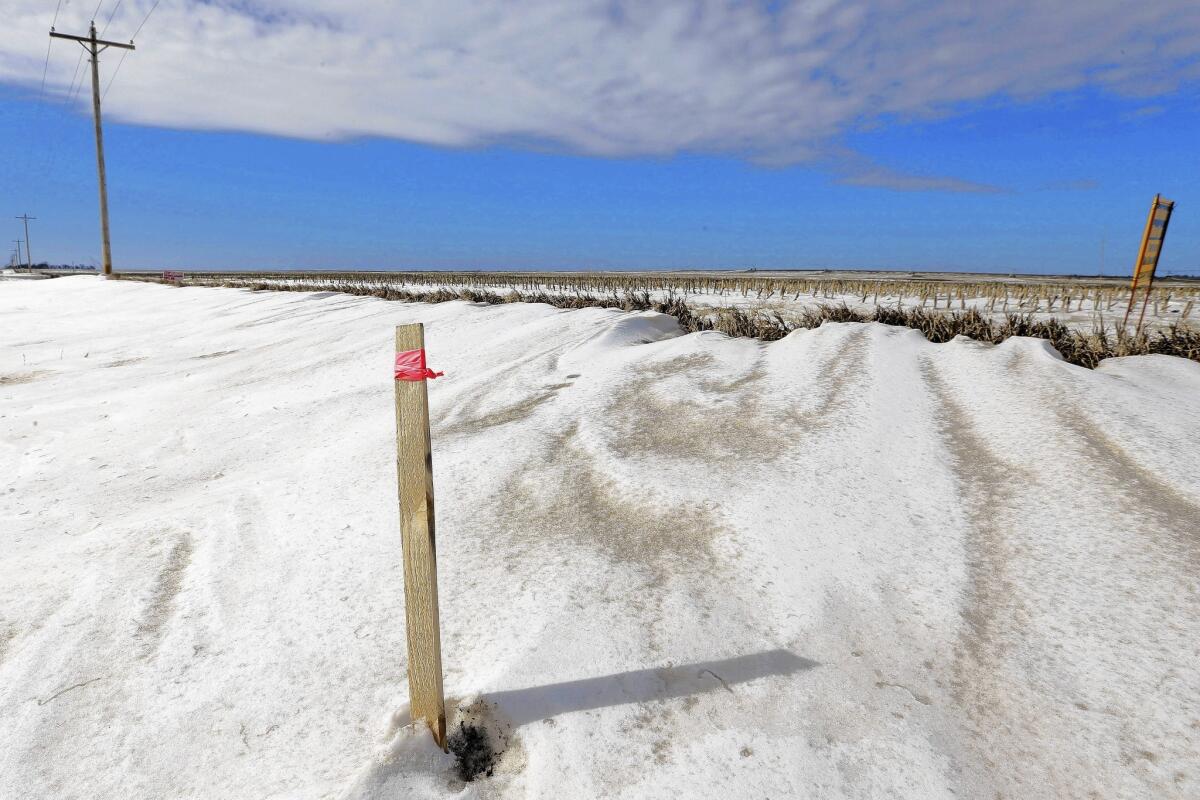Obama administration delays Keystone XL pipeline decision

- Share via
WASHINGTON — The Obama administration on Friday delayed a decision on the construction of the controversial Keystone XL pipeline, citing a Nebraska state court decision that invalidated part of the project’s route.
The latest hold-up in the unusually lengthy review of the $5.3-billion oil pipeline almost certainly will push any decision until after the November midterm election, getting President Obama off a political hook.
The White House has been pressed on one side by environmentalists who have turned opposition to the pipeline into a touchstone issue and on the other by conservative Democrats from energy-producing states who say approving Keystone XL would show the administration’s commitment to job creation.
The pipeline would transport Canadian tar-sands oil from Hardisty, Alberta, to Steele City, Neb., where it would link up with an existing pipeline that runs to refineries along the Texas Gulf Coast. Because it crosses an international border, it needs a presidential permit, which requires a review by the State Department.
The department issued a final environmental impact statement in January and was in the midst of weighing whether the pipeline was in the national interest. The department had sought comments from eight other federal agencies, which were due May 1. But in a statement Friday, the department extended the time to submit those views until the “uncertainty created by the ongoing litigation” was resolved.
That was an about-face. Immediately after the Nebraska court decision in mid-February, Obama administration officials had said the ruling would not affect their deliberations. But in March, the Nebraska Supreme Court agreed to hear the case.
A senior State Department official said Friday that the environmental review completed by the department was “based on certain assumptions about the pipeline route.”
“The lawsuit could lead to confirmation of or a change to the pipeline route,” said the official, who asked not to be identified to discuss the internal process. “That is why we felt it was important to have additional information and a better understanding of what that route might be.”
That could take quite a while. Nebraska’s Supreme Court is expected to hear the case in September or October. The earliest it would issue a ruling would be late this year, said David A. Domina, the Omaha-based lawyer for landowners who sued to block the pipeline.
The plaintiffs in the case, Thompson vs. Heineman, argued that the Legislature and governor violated Nebraska’s constitution when they passed a law in 2012 that gave the governor the authority to determine the route for Keystone XL. The plaintiffs argue that the constitution gives regulatory control over pipelines to the state’s Public Service Commission.
The prospect of Keystone XL cutting through Nebraska has been particularly contentious, because the state is home to the ecologically sensitive Sandhills and the Ogallala aquifer, the main drinking water source for the Great Plains.
Obama said in February that he would make the final decision on the pipeline in a matter of months. He has said he would approve it only if it did not worsen emissions of greenhouse gases that lead to global warming.
Russ Girling, chief executive of TransCanada, which is proposing to build the pipeline, said in a statement that the company was “extremely disappointed and frustrated with yet another delay.”
But environmental groups were thrilled. The League of Conservation Voters hailed the delay as “great news” that “makes us even more confident that the harmful Keystone XL tar sands pipeline will ultimately be rejected.”
Opponents say the project would worsen climate change by opening the tar sands to development. Supporters say that it would reduce U.S. dependence on oil from the Middle East, Africa and other politically unstable parts of the world and that Canada will develop the tar sands whether the U.S. approves a pipeline or not.
The sudden decision, which appeared to catch both sides off guard, is all but certain to become campaign fodder in the midterm election, particularly in the conservative states that are the battleground for control of the Senate.
Friday’s decision could help the party avoid what is already expected to be a depressed Democratic turnout in November. Approval could have alienated the party base of liberal voters and environmental enthusiasts.
And the delay may help Democrats continue to woo wealthy donors, including California billionaire and climate change crusader Tom Steyer, who has promised to raise $100 million to target candidates who oppose efforts to stem global warming.
Republicans, though, are certain to attack Democratic candidates in energy-producing states.
“It is crystal clear that the Obama administration is simply not serious about American energy and American jobs,” said Senate Minority Leader Mitch McConnell (R-Ky.), whose campaign fired off an attack linking his likely Democratic opponent, Alison Lundergan Grimes, to the decision. “Apparently radical activists carry more weight than Americans desperate to get back on the job.”
At the same time, embattled Democrats can “create some space between them and the president” by bashing the administration’s decision, said Jim Manley, a former top Senate aide and Democratic strategist.
Sen. Mary L. Landrieu (D-La.), who is in a tough race for a fourth term, vowed to “use my power as chair of the Senate Energy Committee to take decisive action to get this pipeline permit approved.”
More to Read
Sign up for Essential California
The most important California stories and recommendations in your inbox every morning.
You may occasionally receive promotional content from the Los Angeles Times.












